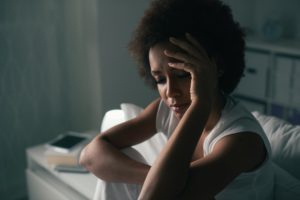
Sleep apps can be a major cause of anxiety and potentially promote poor sleep. According to researchers from Rush and Northwestern Universities, sleep trackers can provide inaccurate data and worsen insomnia as users become obsessed with getting that perfect sleep—a condition termed “orthosomnia.”
One drawback to the technology is that although it provides information, it supplies no advice. People observe that they might not have slept enough, and it can send them into a frenzy. Another drawback is that the data may not necessarily be accurate.
For example, because most commercially available sleep-tech calculates sleep based on blood pressure and movement, it may inaccurately track REM sleep, a portion of the sleep cycle when people may become animated on one way or another. By failing to properly monitor sleep cycles, the apps may not offer accurate data.
The average sleep cycle takes about 90-minutes and would repeat four or five times to be considered a “good sleep.” Each cycle has three stages:
- Light sleep: Easy to wake up and is a transition phase taking up only about three percent of total sleep time.
- Deep sleep: Beneficial for muscle repair and metabolic recovery.
- REM (rapid eye movement) Sleep: When dreaming occurs and psychological and emotional networks are repaired.
These cycles do not occur in the same fashion each time through, which is likely why you need to complete four or five. Typically, earlier cycles have more deep sleep, and later ones have more REM. By not identifying these differences, or perhaps mistaking REM sleep for periods of wakefulness, it might provide inaccurate data on sleep duration and quality.
Checking your sleep app every day can feed a vicious cycle of poor sleep and anxiety and might be worthwhile to lay off of it for a while. If you’d like to continue to wear it, it may be a better strategy to look at the results on a weekly or monthly basis, rather than daily.
To get a better idea of how you’re sleeping, ask yourself if you feel refreshed each morning when you wake up. If not, here are a few strategies to try including:
- Setting a bedtime and wake schedule (and sticking to it)
- Keeping your bedroom cool (around 68 F/ 20 C)
- Making your bedroom as dark as possible
- Avoiding email/social media/stimulating conversation/anger/stress before bed
- Avoiding alcohol and caffeine in the evening